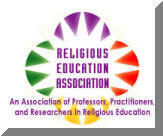 |
The
Religious
Education
Association
An Association of
Professors, Practitioners, and Researchers in Religious Education
|
|
Many of the documents on this site require Acrobat Reader to view. |
2007 Meeting ThemeCulture that Matters Intercultural Explorations in Religious Education We live in an interconnected world where human groups are discovering each other in new ways. And once again, culture matters! Through culture each human group mediates the world and forges an identity within that world. Religions are crucial in facilitating this process. There is no religious tradition that one way or the other reflects, explains, justifies, and perpetuate the cultural patterns of those who participate of that tradition. These patterns include the cultures represented in the sacred texts but also the cultural identities of its interpreters. Within those traditions religious educators function as cultural workers- through the language and forms of religious faith and practices, a particular culture is transmitted. Race, ethnicity, nationality, gender, class, age, and other indicators of human diversity are not foreign to religious knowledge and practices but they provide the cultural loci from which we explain the desired universality of our religious beliefs. If religious belief and faith experience are intrinsically connected to the cultural forms that shape our religious identity it is important to ask: In what ways is faith transmission mediated by what I find valuable in my culture? How does my cultural identity influence my thinking about religion and education? Can I reflect on the distinction between the “content” of faith or tradition and my own cultural identity? In what ways is what I teach, and the ways I teach, a reflection of cultural influences and interests? Are there ways in which your teaching exclude or alienate learners because of the cultural values upon which is based? By taking consciousness of our cultural approaches to religious education we open ourselves to religious knowledge from other people’s culture. Thus we may ask; What have we encountered worth incorporating into our evolving religious identity? What can I find in other cultural expressions that not only make us more sensitive and tolerant but help us revisit our own understanding of the life-long process of faith formation? I invite religious educators to explore these questions an by doing so to promote intercultural dialogues that will further enhance our faith knowledge (beyond ethnocentric theologies) and improve our efforts to educate people in faith (beyond ethnocentric pedagogies). I invite religious educators to do so by “making the familiar strange and the strange familiar.” More than ever culture matters and religious educators are challenged to make explicit the culture(s) that matter to their efforts of faith formation and transformation. Questions
and comments about the theme and offers to assist in the design of
the meeting may be directed to President-Elect, Dr. Jose Irizarry.
Email:
JIrizarr@mccormick.edu |
|||||||||||||||||||||||